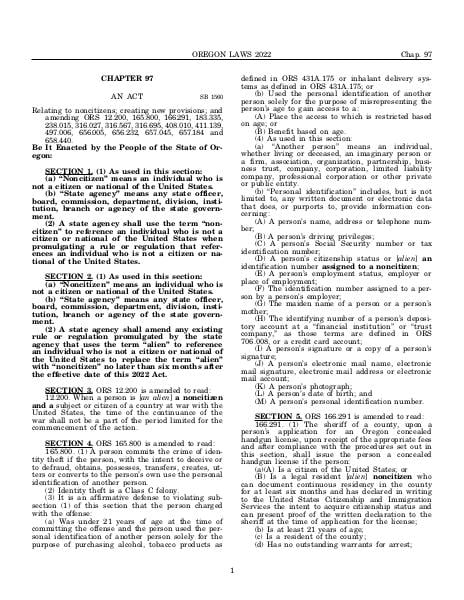Identity theft
Source:
Section 165.800 — Identity theft, https://www.oregonlegislature.gov/bills_laws/ors/ors165.html.
Notes of Decisions
Person does not convert personal identification to person’s own use by giving police officer false information concerning identity. State v. Fields, 191 Or App 127, 79 P3d 915 (2003)
Intent to “deceive” denotes attempt to obtain benefit to which deceiver is not lawfully entitled and therefore does not include substantial amount of protected speech. State v. Porter, 198 Or App 274, 108 P3d 107 (2005)
Intent to defraud includes intent to cause injury to another person’s legal rights or interests. State v. Alvarez-Amador, 235 Or App 402, 232 P3d 989 (2010)
Victim of crime is any person whose personal identification could be used by another person for deceptive or fraudulent ends, and it is immaterial whether that risk is realized or whether economic or reputational injury actually occurs. State v. Mullen, 245 Or App 671, 263 P3d 1146 (2011), Sup Ct review denied
Where defendant’s name was added to victim’s bank account because defendant was named as victim’s power of attorney, and defendant withdrew all funds from account, defendant did not commit crime of identity theft because defendant accessed account using defendant’s own access credentials. State v. Zibulsky, 266 Or App 633, 338 P3d 750 (2014)
Where defendant gave police officer false name and birthdate and signed fingerprint card and property receipt with same false name, defendant had “intent to deceive” officer as used in this section. State v. Medina, 357 Or 254, 355 P3d 108 (2015)
Where defendant gave police officer false name and birthdate and signed fingerprint card and property receipt with same false name, defendant did not “utter . . . personal identification of another person,” which requires defendant to have issued, delivered, transferred, published, circulated, disseminated or tendered documents. State v. Medina, 357 Or 254, 355 P3d 108 (2015)
Where defendant gave police officer false name and birthdate and signed fingerprint card and property receipt with same false name, defendant did not convert to defendant’s own use another’s personal identification because defendant did not take, appropriate or divest other person of personal identification for defendant’s own use. State v. Medina, 357 Or 254, 355 P3d 108 (2015)
Where defendant’s cellmate willingly allowed defendant to take over telephone call that cellmate made with cellmate’s own personal identification number, defendant did not appropriate cellmate’s personal identification number without consent or permission; thus, defendant did not convert cellmate’s personal identification number to defendant’s own use and did not commit crime of identity theft. State v. Ritter, 280 Or App 281, 380 P3d 1160 (2016)
A person “transfers” personal identification of another by selling or giving possession or control of that personal identification to third person for fraudulent or deceptive purposes. State v. Bowen, 280 Or App 514, 380 P3d 1054 (2016)
Where defendant gave possession or control of victim’s credit card information to retailer for defendant’s own fraudulent use, defendant did not give possession or control of victim’s credit card information to another to use to defraud victim and therefore did not “transfer” credit card under this section. State v. Bowen, 280 Or App 514, 380 P3d 1054 (2016)
Where defendant gave possession or control of victim’s credit card information to third party for third party to use to defraud victim, defendant “transferred” credit card under this section. State v. Bowen, 280 Or App 514, 380 P3d 1054 (2016)
Essence of obtaining or possessing personal identification is exercise of control over identification. State v. Connolly, 296 Or App 492, 439 P3d 481 (2019), Sup Ct review denied
